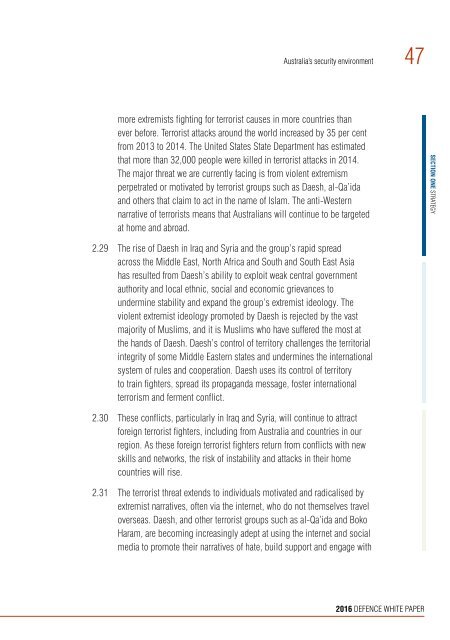2016 DEFENCE WHITE PAPER
2016-Defence-White-Paper
2016-Defence-White-Paper
Create successful ePaper yourself
Turn your PDF publications into a flip-book with our unique Google optimized e-Paper software.
Australia’s security environment 47<br />
more extremists fighting for terrorist causes in more countries than<br />
ever before. Terrorist attacks around the world increased by 35 per cent<br />
from 2013 to 2014. The United States State Department has estimated<br />
that more than 32,000 people were killed in terrorist attacks in 2014.<br />
The major threat we are currently facing is from violent extremism<br />
perpetrated or motivated by terrorist groups such as Daesh, al-Qa’ida<br />
and others that claim to act in the name of Islam. The anti-Western<br />
narrative of terrorists means that Australians will continue to be targeted<br />
at home and abroad.<br />
SECTION ONE STRATEGY<br />
2.29 The rise of Daesh in Iraq and Syria and the group’s rapid spread<br />
across the Middle East, North Africa and South and South East Asia<br />
has resulted from Daesh’s ability to exploit weak central government<br />
authority and local ethnic, social and economic grievances to<br />
undermine stability and expand the group’s extremist ideology. The<br />
violent extremist ideology promoted by Daesh is rejected by the vast<br />
majority of Muslims, and it is Muslims who have suffered the most at<br />
the hands of Daesh. Daesh’s control of territory challenges the territorial<br />
integrity of some Middle Eastern states and undermines the international<br />
system of rules and cooperation. Daesh uses its control of territory<br />
to train fighters, spread its propaganda message, foster international<br />
terrorism and ferment conflict.<br />
2.30 These conflicts, particularly in Iraq and Syria, will continue to attract<br />
foreign terrorist fighters, including from Australia and countries in our<br />
region. As these foreign terrorist fighters return from conflicts with new<br />
skills and networks, the risk of instability and attacks in their home<br />
countries will rise.<br />
2.31 The terrorist threat extends to individuals motivated and radicalised by<br />
extremist narratives, often via the internet, who do not themselves travel<br />
overseas. Daesh, and other terrorist groups such as al-Qa’ida and Boko<br />
Haram, are becoming increasingly adept at using the internet and social<br />
media to promote their narratives of hate, build support and engage with<br />
<strong>2016</strong> <strong>DEFENCE</strong> <strong>WHITE</strong> <strong>PAPER</strong>


